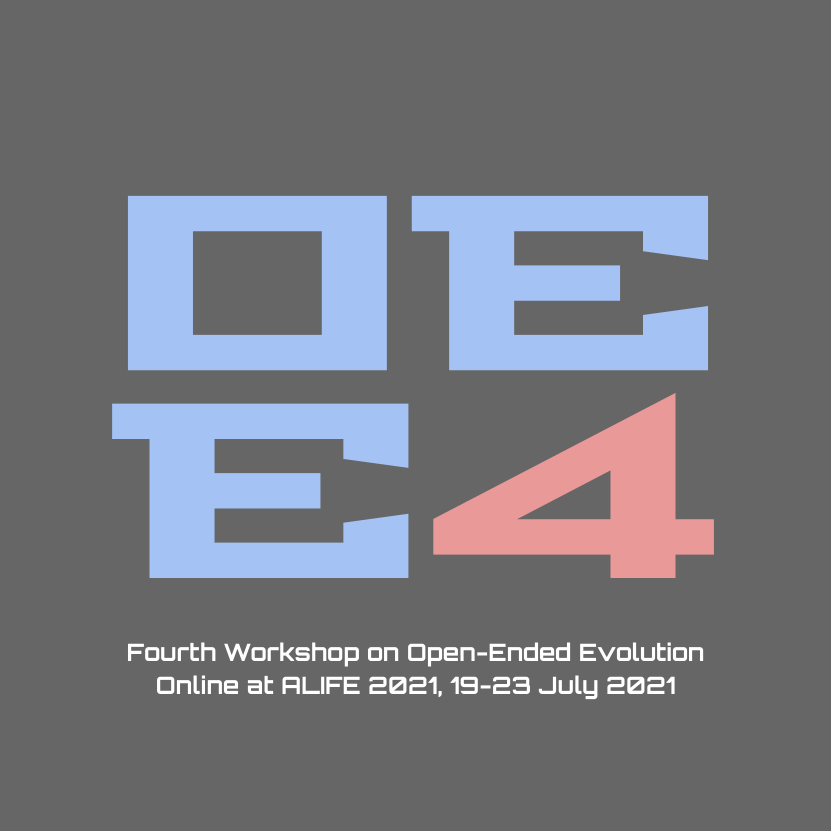OEE4: The Fourth Workshop on Open-Ended Evolution
Taking place at the 2021 Conference on Artificial Life (ALIFE 2021), Online, Thursday 22 July 2021
Introduction
Overview
Loosely defined, an open-ended evolution system is one that is capable of the ongoing generation of interesting novelties. These novelties may be at the level of an individual agent's interactions with its environment (including other agents), of an agent's internal organization, or of the evolutionary process itself. Some definitions of OEE further require that the maximum complexity of organisms in the system increases over time, or that ecosystem complexity increases. The editorial introductions (intro #1 and intro #2) to the Artificial Life journal special issues on OEE (issue 25(1) and 25(2)), published in 2019 following the third workshop on OEE, summarized the different kinds or categories of OEE and progress in the field as represented by the articles in the special issues.
Topics of Interest
The goal of the Fourth Workshop on Open-Ended Evolution (OEE4) is to build upon the outcomes of the three previous workshops and the 2019 special issues, through presentations and discussions on:
- important new results, for example empirical demonstration of the behavioral hallmarks of a system undergoing OEE, or novel analysis of the mechanisms underlying such or relating to the detection of novel functionality or agency;
- the main lessons learned and milestones achieved in the papers from the 2019 special issues on OEE and other important recent papers on OEE; and
- the key challenges in OEE.
Important new results are always a highlight of OEE workshops, and lessons learned and key challenges are especially useful to revisit after scientific milestones like the recent special issues on OEE (issue 25(1) and 25(2)). Participants are asked to reference the OEE special issues and to fit their current contributions into the framework we are trying to build. The workshop's goals include developing plans for a book of new papers on OEE by the leading figures in the field, discussing highlights and headlines from the special issues as well as new scientific results. In addition to a series of short talks relating to items 1, 2 and 3 above, the workshop will include a group discussion of lessons we should learn from the OEE special issues and newer work; and an organizational session (to review deadlines and guidelines etc.) for the planned book of new papers on OEE.

Important Dates
| Submission deadline (extended abstracts or full papers) |
|
| Notification of acceptance |
|
| Website-ready copy due |
|
| Abstracts and papers published on the workshop website |
|
| Workshop date | Thursday 22 July 2021 |
Schedule
| Time (CEST) | Title | Presenters | US West Coast Time (PDT) | US East Coast Time (EDT) | UK Time (BST) | Japan Time (JST) |
| Session 1 (12:30-14:30 CEST) (chair: Alastair Channon) | ||||||
| 12:30-12:35 | Introduction Video (YouTube) |
Alastair Channon | 03:30-03:35 | 06:30-06:35 | 11:30-11:35 | 19:30-19:35 |
| 12:35-12:45 | Open-endedness: a research forum
quick talk |
Norman Packard | 03:35-03:45 | 06:35-06:45 | 11:35-11:45 | 19:35-19:45 |
| 12:45-13:05 | Modelling and measuring open-endedness
standard talk |
Susan Stepney | 03:45-04:05 | 06:45-07:05 | 11:45-12:05 | 19:45-20:05 |
| 13:05-13:15 | Evolutionary Innovation Viewed as Novel Physical Phenomena
quick talk Video (YouTube) |
Tim Taylor | 04:05-04:15 | 07:05-07:15 | 12:05-12:15 | 20:05-20:15 |
| 13:15-13:35 | A procedure for testing for Tokyo Type 1 Open-Ended Evolution
standard talk Video (YouTube) |
Alastair Channon | 04:15-04:35 | 07:15-07:35 | 12:15-12:35 | 20:15-20:35 |
| 13:35-13:45 | Towards automatic generation of congestion control algorithms
quick talk |
Teruto Endo, Hirotake Abe and Mizuki Oka | 04:35-04:45 | 07:35-07:45 | 12:35-12:45 | 20:35-20:45 |
| 13:45-14:05 | Can Mutual Imitation Generate Open-Ended Evolution?
standard talk |
Takashi Ikegami, Atsushi Masumori, John Smith and Norihiro Maruyama | 04:45-05:05 | 07:45-08:05 | 12:45-13:05 | 20:45-21:05 |
| 14:05-14:25 | Evolved Open-Endedness in Cultural Evolution
standard talk |
James M. Borg and Simon T. Powers | 05:05-05:25 | 08:05-08:25 | 13:05-13:25 | 21:05-21:25 |
| Break (14:30-15:00 CEST) | ||||||
| Session 2 (15:00-17:00 CEST) (chair: Tim Taylor) | ||||||
| 15:00-15:10 | Questions for the Open-Ended Evolution Community: Reflections from the 2021 Cross Labs Innovation Science Workshop
quick talk |
Kevin Frans, L. B. Soros and Olaf Witkowski | 06:00-06:10 | 09:00-09:10 | 14:00-14:10 | 22:00-22:10 |
| 15:10-15:20 | Necessary Conditions for Open-Ended Evolution Empirically Validated in Chromaria
quick talk |
L. B. Soros and Kenneth O. Stanley | 06:10-06:20 | 09:10-09:20 | 14:10-14:20 | 22:10-22:20 |
| 15:20-15:40 | Case Study of Novelty, Complexity, and Adaptation in a Multicellular System
standard talk Video (YouTube) |
Matthew Andres Moreno, Santiago Rodriguez Papa and Charles Ofria | 06:20-06:40 | 09:20-09:40 | 14:20-14:40 | 22:20-22:40 |
| 15:40-15:50 | Modelling and Implementing Open-Ended Evolutionary Systems
quick talk |
Patrik Christen | 06:40-06:50 | 09:40-09:50 | 14:40-14:50 | 22:40-22:50 |
| 15:50-16:20 | In Pursuit of Open-Ended Algorithms
invited talk |
Kenneth O. Stanley | 06:50-07:20 | 09:50-10:20 | 14:50-15:20 | 22:50-23:20 |
| 16:20-16:30 | Kuhnian suggestions for the study of open-ended evolution
quick talk |
Mark A. Bedau | 07:20-07:30 | 10:20-10:30 | 15:20-15:30 | 23:20-23:30 |
| 16:30-17:00 | General discussion and organization meeting | led by Mark A. Bedau and Norman Packard | 07:30-08:00 | 10:30-11:00 | 15:30-16:00 | 23:30-00:00 |